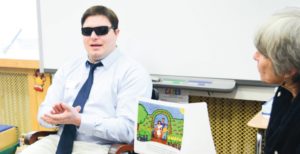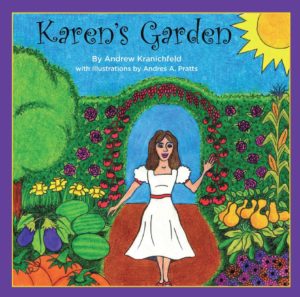When Andrew Kranichfeld started holding programs for schoolchildren based on his first book, “Karen’s Garden,” he would first show them fresh produce. Then he’d pull out a bag of Doritos and tell them to look at the nutrition facts.
“On the back, it would have many ingredients. You don’t even know what half the stuff is,” he chuckled. “I could usually sound them out when I could see, but it wasn’t easy.”
See, Kranichfeld is blind, but he doesn’t let that get in the way of doing what he loves, like running, cooking, going out to eat, enjoying live music and writing. At age 32, he is a children’s book author with a focus on the environment and gardening.

His latest book, “Oliver Saves the Nature Center,” came out in December 2015 and has themes of Earth science, ecology, community and environmentalism— all topics he feels children should be more aware of during what he feels is an important time in human history. The book stars a character based on Kranichfeld’s older brother, Oliver, who worked at the Rye Nature Center as an environmental educator for five years. Kranichfeld himself used to volunteer there as a summer camp counselor while at Rye High School.
A month or two after turning 26, Kranichfeld learned that he had a brain tumor, which was misdiagnosed twice. His first medical opinion resulted in chemotherapy that made the tumor grow a little bigger. His vision went from being a little blurry, “like wearing glasses with Vaseline on them,” to getting much worse.
When his doctors realized their first mistake, Kranichfeld was then given steroids intravenously, and he lost his sight and gained a lot of weight soon after.
“After I went blind, and getting the brain tumor, I was looking for an outlet for not just creativity, but a way to [produce] something that people would enjoy and learn from, and writing a book seemed like the right way,” he said.
When he holds programs for children, Kranichfeld tells them to be mindful of what they’re putting into their bodies and that being in touch with nature—by gardening, for example—is important. “When you grow the plants yourself, you know they’re fresh; they’re nutritious,” Kranichfeld said. “If you buy them at the store, they might be covered in pesticides, they might have wax on them, they might be old—you don’t really know.”
He stresses the importance of growing food locally, and tells the children he talks to that gardening is a great way to get some exercise and fresh air. “You’re outside, digging in the earth, connecting with Mother Nature. Everyone these days—young and old people—is always on their cellphones, computers or iPads, so it’s a very important message for little kids that you shouldn’t be on these gadgets all day,” he said.

He ends his visits by showing children the adaptive technology he uses every day, including Facebook, Google, texting and using various iPhone apps. He shows students apps that can tell him money denominations and help him get dressed by identifying the colors of the clothing he picks out. “Getting to spend time with a disabled person, students learn that they’re just a normal person. I’m just different in that I can’t see,” he said.
Kranichfeld grew up in Rye, in a household that he called “a unique place,” located in a large field, surrounded by hedges on 4 acres of land near a brook in the backyard. The property also had three greenhouses, only one of which was used for growing food.
There was an outdoor garden, too, where his mother had friends and some coworkers use part of, like a coop. “People would have their own sections where they’d grow their own fruits and vegetables and they’d share them with each other,” he said.
His mother, Karen, passed away in March 2010 after battling leukemia—just days before Kranichfeld learned of his brain tumor. “I really loved my mom; we were very close,” he said, adding that “Karen’s Garden” is a tribute to her. The book is also important to him because his mother was only 59 when she died.
“This was a way that I could not only tell her story, but maybe get some really young kids into gardening—in a way, passing on her legacy of gardening to other people,” he said.
His family also travelled to some interesting places when he was younger, like camping at a game reserve in Botswana and visiting the J.N. Ding Darling wildlife refuge on Sanibel Island, Florida. He credits his childhood experiences, especially visiting these places he saw as “untouched nature,” as one reason why he cares for the environment. He also played hockey at Rye High School for three years. He dabbled in other sports, like soccer and softball, but hockey is the one that stuck.
Although he lives in the Bronx, Kranichfeld still has many fond memories of Rye. “As a community, Rye has really stood behind me,” he said. He mentions an event called the Chowder Cup, a fundraiser on ice, when he was given the nickname “Chowder” after skating for the first time in five years since losing his sight.
With his latest book, Kranichfeld tried to think of a subject that would be relevant to current events and would engage both children and their parents, since they buy the books.
His audience—at least for now—is children because of the books he read when he was young, like Dr. Seuss. He said that although the books were fun, their messages left a huge impression on him.
“We are sort of at a turning point in history where we really need to start doing something about climate change. That’s what I try to put into my books,” Kranichfeld said. “If everyone starts to make little changes in their lives, it does make a difference.”








